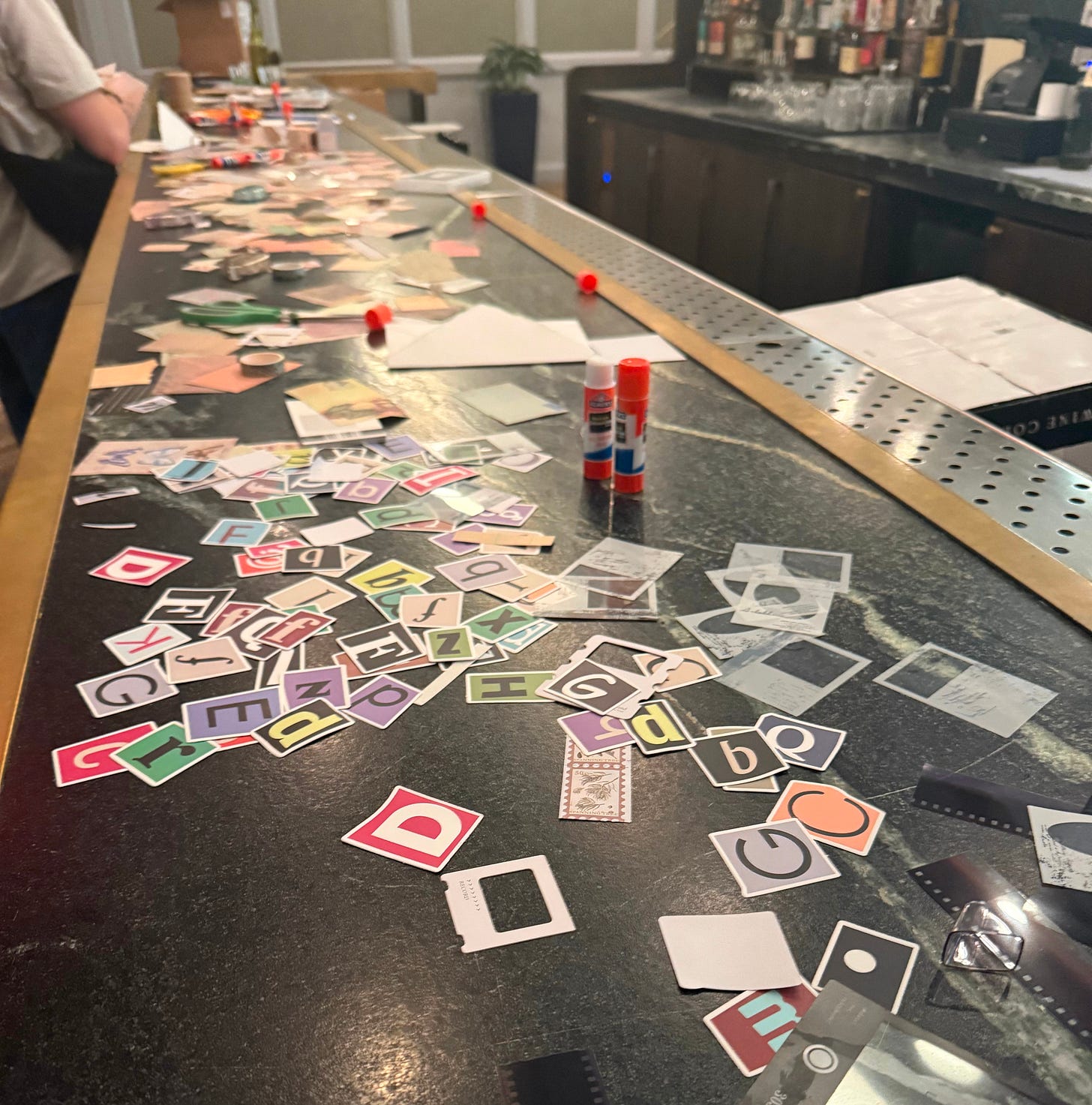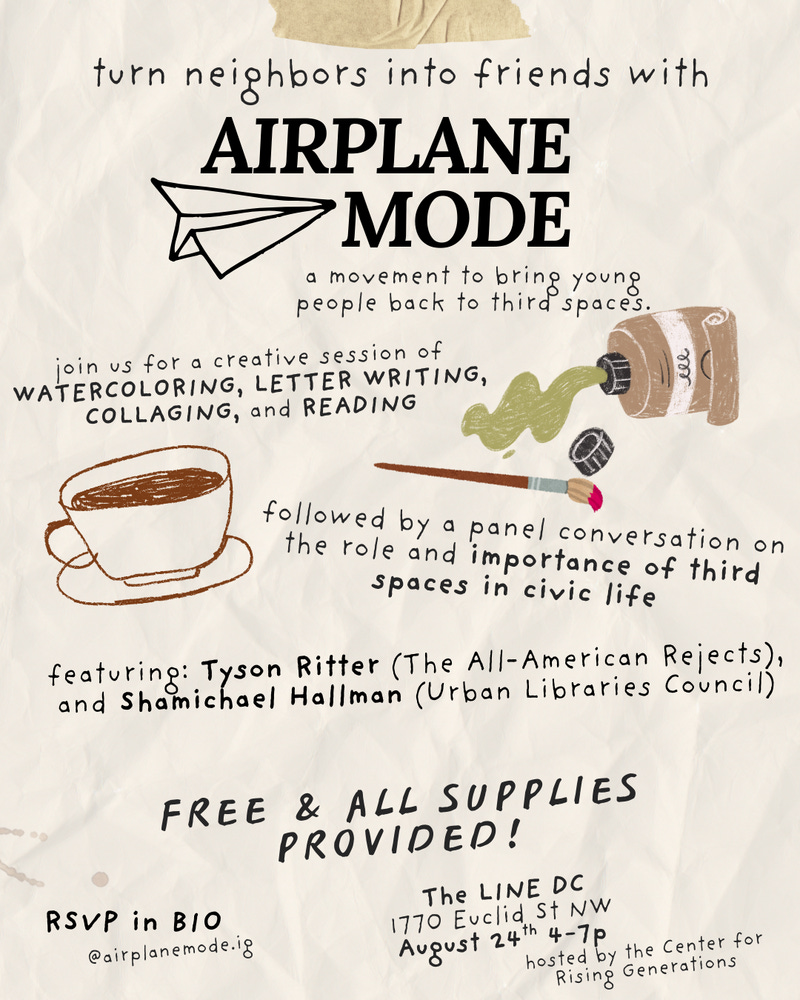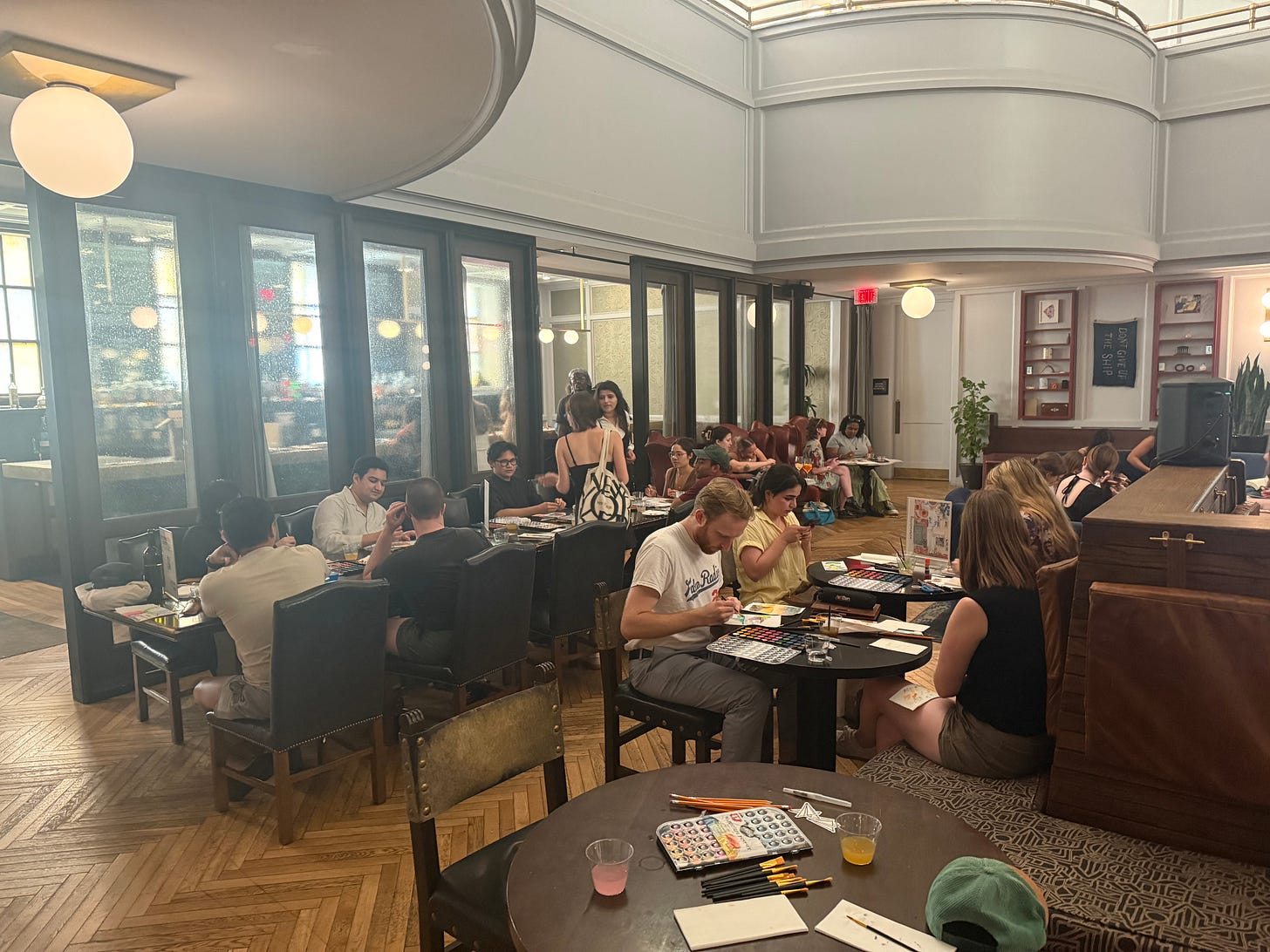Airplane Mode: Rediscovering Connection in a Lonely Age
On Sunday afternoon I joined a room full of young people in Washington, D.C., for the inaugural Airplane Mode gathering. Hosted by the Center for Rising Generations at the Aspen Institute, the premise was simple: bring young people back to third spaces and encourage creativity, connection, and community. From 4 to 5:30 p.m., participants took part in creative activities such as watercoloring, reading, letter writing, and collaging, with all supplies provided. As I walked the room, watching how everyone engaged and joining in various conversations, I could not help but marvel at how many elements of the event mirrored what you might see at a typical library program, particularly the opportunity to be creative. Yet there were some elements that elevated this gathering and that the event coordinators had clearly given additional thought, such as the presence of music, snacks, and a bar.
What was unmistakable was that events like this, and the creativity that drives them, are much needed for this generation. In all of the conversations about loneliness in this country, this particular age group is often left out, even though data from the U.S. Surgeon General’s report on loneliness shows that the rate of loneliness among young adults increased every year between 1976 and 2019. Layered onto this are conversations about how digital environments affect our social health. A variety of technologies have quickly and dramatically changed how we live, work, communicate, and socialize. These technologies include social media, smartphones, virtual reality, remote work, and artificial intelligence, to name just a few. This is why an event such as Airplane Mode, with its invitation to put phones away and step back into the practice of being human together, is so vital.
From 5 to 7:30 I sat on a panel on the role and importance of third spaces in public life alongside Tyson Ritter of The All-American Rejects and Josh Morin of Temperance Alley Garden. Each of them brought incredible insights into the importance of third spaces and how they have seen and activated public space in new ways. A number of themes emerged, anchored by fascinating questions:
What keeps young people afraid of gathering, even in safe, welcoming spaces?
How do we make civic engagement accessible without first restoring connection?
What role can religion or faith play in creating inclusive third spaces?
How can young adults reclaim spaces of belonging without them being commodified or co-opted?
What can each of us offer in these spaces, not just consume?
From these questions, four themes stood out:
Community and Belonging – Young people crave authentic, in-person community but still battle social anxiety and post-COVID habits.
Accessibility and Equity – Many opportunities for connection are expensive or exclusive, making spaces like libraries and community gardens all the more vital.
Creativity as a Bridge – Music, art, storytelling, and gardening create natural points of connection across differences.
Loneliness and Disconnection – Loneliness is both a cultural epidemic and a barrier to civic engagement.
Reflections for Libraries and Beyond
These themes did not just stay on the panel stage—they carried into my own reflections on what they mean for libraries and other civic institutions.
Community and Belonging. Again and again, I heard the hunger for authentic spaces where people ages 18 to 30 can belong. The pandemic interrupted rites of passage like graduations, concerts, and college friendships, and it also rewired us to keep six feet apart. That gap has not fully closed. Many young adults admitted they still feel uneasy gathering, even though it is precisely what their souls long for. In a world of constant online “connection,” loneliness has quietly become the epidemic of this generation.
Accessibility. Tyson described the alienation of playing expensive venues where only a certain crowd could afford to show up, and it made me think about new ways we should communicate the value of accessibility. He recalled that when he played in a backyard or a bowling alley, young people who had never crowdsurfed suddenly found themselves lifted by their peers. I heard similar echoes in the story of a D.C. community garden, once a vacant lot and now a place where neighbors create, play, and grow together.
Creativity. Music, art, gardening, and storytelling are not luxuries. They are bridges that allow us to cross into vulnerability and dialogue. Creativity breaks the ice so conversations can go deeper, as was the case for this event where fellowship, food, and creative expression paved the way for an hour of conversation that could have easily gone on longer. At least six hands were raised with questions we simply did not have time to answer.
Loneliness and Democracy. Finally, the day raised the urgent connection between loneliness and democracy. Civic engagement cannot thrive if people feel disconnected and unseen. As one participant put it, “You cannot ask people to serve without first restoring community.” Walking away from Airplane Mode, I felt hopeful and energized. The challenge before us is not to invent new tools of connection but to courageously reclaim the ones we have always had.
It also mattered that this conversation took place at The LINE DC. The building itself carries a story that mirrors what Airplane Mode was trying to spark. Once a neoclassical church built in 1912, it sat empty for nearly 25 years before being reimagined as a hotel and cultural hub. I can see why the organizers of Airplane Mode chose this space for their first gathering. The LINE DC has a way of inviting you in. It almost nudges you toward fellowship and conversation, reminding us that the places we choose to gather can either keep us apart or draw us closer together.
A big thanks to Winter Minisee, Kanika Mehra, and the entire staff of the Center for Rising Generations for the invitation to the event. I look forward to seeing how future events, the next of which will actually be hosted at Martin Luther King Jr. Memorial Library, will play out.




